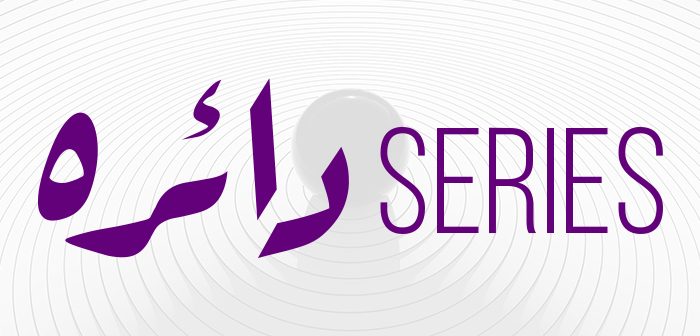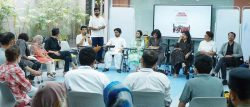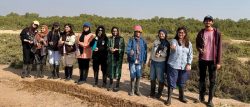Grounded in decolonial pedagogy and an emphasis on dialogue, the Academic Centres at Habib University, including the Interdisciplinary Development Research and Action Center (IDRAC), Tasveer o Tasavur, and Arzu Center for Regional Languages and Humanities (ARZU), have initiated a series of conversations. These conversations, part of the Daayra (دائرہ) series, encourage faculty and students to reflect on their courses, methodologies, and intellectual engagements. The series aims to cultivate transparency in academic structures and create meaningful connections between courses across disciplines.
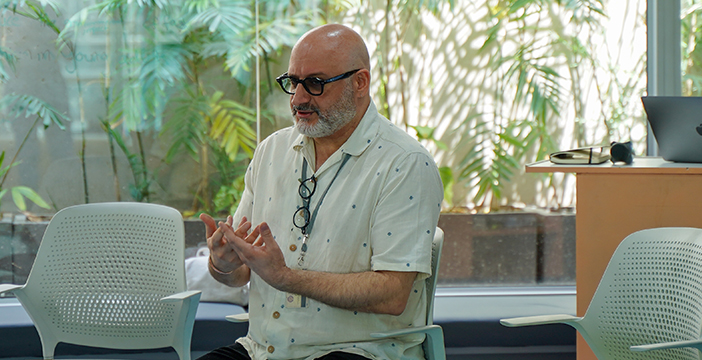
Dr Behzad Khosravi Noori (Director of Academic Centres at Habib University) explaining the concept of the title Daayra دائرہ, that originates from Ibn Khaldun’s book Muqaddimah, describing the classroom structure as a circle.
Decolonial Pedagogy and Open-Ended Conversations:
Departing from traditional lecture formats, the Daayra دائرہ series promotes open-ended conversations about teaching and learning methods. Each session centers on a core question – “What is..?” – prompting participants to explore themes of reparation, decolonial thinking, and the intersections of knowledge production relevant to their courses.
Two talks have been presented by the Daayra دائرہ Series: the first conversation explored teaching and learning experiences through two interconnected courses by Dr Behzad Khosravi Noori (Associate Professor of Practice in the Communication and Design program, and Director of the Academic Centres): Postcolonial Theory and Decolonial Creative Practices and Necromancing and Artistic Research: A Decolonial Approach. Both courses examine the necessity for speculative artistic approaches based on the intersections of postcolonial theory and decolonial creative practices and their pedagogical and artistic implications. The series features student reflections and their projects exploring themes about reparation and decolonial thinking. The other talk was titled, Anthropology of Religion, a session that was led by Basharat Issa (Lecturer in the Comparative Humanities program), centered on religion’s role and expression in different societies. Also featuring reflections from students, the talk encouraged looking at one’s individual story and “to highlight our voices, as those voices are under the shadow.” They also explored their own individual negotiations and deconstruction of the term ‘religion.’
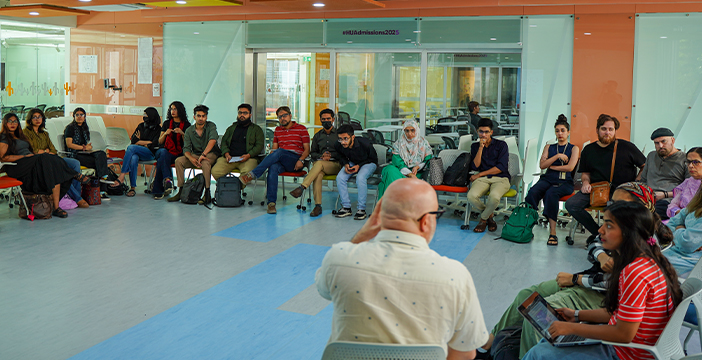
Students and faculty sitting around in an encircled setting during the first talk held at Horizon.
Mehak Shaikh, Social Development and Policy’27, shared, “The readings and studies that we looked at in the Anthropology of Religion course made me realize that religion cannot be studied in isolation. It also made me more welcoming towards other religions when we looked at it as a social phenomenon.”
Emphasizing a Decolonial Approach:
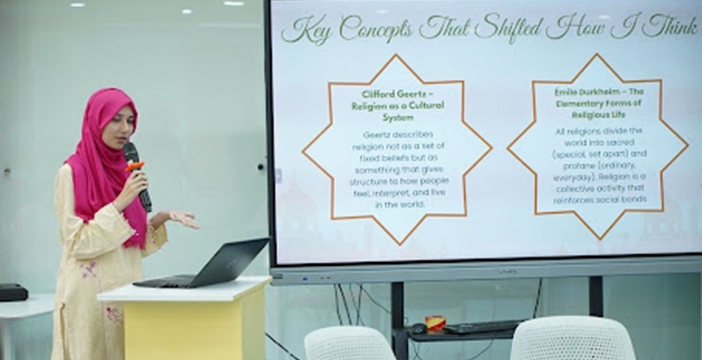
Fizza Hasan, Comparative Humanities’27, presenting her project in the course, Anthropology of Religion, that studied the Zuljana horse in Shia Islam as a sacred cultural symbol.
Habib University emphasizes a decolonial approach to curriculum, one that repairs and heals individuals. By centering the voices of students and faculty, the Daayra دائرہ series proposes a critical reflection on postcolonial education, challenging disciplinary silos and advocating for a more interconnected academic culture. These discussions critically examine inherited pedagogical frameworks, urging participants to rethink the intersections of disciplines, methodologies, and learning practices to elaborate a more engaged and transformative educational experience for both learners and teachers.
Join the conversation and be part of a transformative educational journey that challenges and inspires! Explore our Academic Centers here: AHSS – Academic Centers and Publications

